- Home
- Alex Archer
Beneath Still Waters Page 2
Beneath Still Waters Read online
Page 2
Another smile.
“I’m afraid I can’t do that.”
Brandt paused, a sudden suspicion forming. “And why not, Major?”
“Because I’m going with you, of course,” Adler said.
Chapter 2
Honestly, he should have seen it coming; he knew that. With a plane full of treasure and Hitler’s personal papers in hand, he shouldn’t have expected to make the trip alone. It would have been too easy to do exactly what he’d been thinking of doing, turning over the plane and its cargo to the Allies. An ordinary soldier wouldn’t have worked as a guard, for he might have been convinced to abandon his post given the failing war effort, Brandt knew.
But an officer of the Waffen SS, the most fanatical of all Nazi units? That was the perfect choice. Brandt had no doubt that Adler would carry out his orders to the letter no matter what was happening on the home front, and nothing Brandt could say to him was going to change that. Especially since their orders had been hand delivered by Hitler.
Best make the most of it, he’d thought to himself and set out to do just that.
He spent the next half hour giving Adler a lecture on how to operate the rear-facing 13 mm machine guns in the rear cockpit. They didn’t have ammunition to spare, so Adler was going to have to forego any practice, but it really wasn’t all that difficult, just point and shoot. They had a much higher chance of survival with someone manning the guns if they were jumped by an Allied patrol, for the attack would most likely come from behind and any attempt Brandt made to outrun it would make his forward-facing 20 mm cannon next to useless.
While he was doing that, the crew loaded the crates into the aircraft and secured them so that they wouldn’t slide around in the event he was forced to make any sudden maneuvers. He double-, then triple-checked their work once they were done; given their weight, even a single loose crate could be potentially disastrous if it came free in the midst of combat.
By the time the cargo was loaded, it was close to noon. Brandt would have been perfectly happy to wait to take off under the cover of darkness, but the higher-ups had other plans. As soon as they were loaded, the order came for them to get underway.
Brandt sighed. Even with the future of the Reich at stake, high command still wasn’t thinking straight.
He climbed into the cockpit, stashing the satchel Hitler had given him under his seat, which was the only place big enough in the cockpit to hold it. He strapped himself in and began going through the preflight check, making sure that all of the instruments were working and the controls were responding properly before they left the mechanics behind for good. Behind him he could hear Adler testing the movement of the guns.
They took off moments later, with Brandt in the front of the cockpit in the pilot’s seat and Adler in the rear manning the 13 mm machine guns, leaving the nose gunner–bombardier position empty. Brandt hoped they weren’t going to regret that decision later.
The men’s seats were literally back-to-back, so they could pass instructions and information to each other simply by shouting over their shoulders, but there was an internal intercom system available, as well. As Brandt took the plane into a vertical climb to give them some altitude, he heard Adler shout, “For the glory of the Reich!” but chose not to reply. He wasn’t doing this for the Reich, after all. He just wanted to get out of Germany alive.
Once in the air, he turned the aircraft to the south and began to follow the route Hitler had shown him on the map, flying from Potsdam to Nuremberg before turning east to cross the Swiss Alps near Salzburg. Once over the Alps they would make their way through Austria and into Hungary, continuing from there down to Romania and then out over the Black Sea.
The extra weight from the cargo made the aircraft sluggish and slow to respond to Brandt’s commands, just as he’d suspected it would. He made a few preliminary maneuvers, getting a feel for the way the aircraft responded so that he would know what he could and couldn’t do in an emergency. The plane moved about the sky with all the finesse of a brick, which was going to make matters rather difficult if they encountered enemy aircraft, but there wasn’t anything he could do about it at this point.
It is what it is, he thought stoically.
They had been in the air for just over an hour and had started crossing the Austrian Alps when things went south.
Brandt glanced at the topographical map in his lap, making certain that he knew exactly where he was in relation to the peaks below him, and when he looked up again a pair of American P51 Mustang attack fighters were diving out of the sun to his right. He never would have seen them if the second aircraft hadn’t made the mistake of changing its angle of attack too early, allowing the sun to glint off the steel edge of the wings.
It wasn’t much, but Brandt was a veteran pilot who had survived more than a hundred missions over the past few years, and that was more than most. Without hesitation he shoved the yoke forward and threw the Junkers into a desperate dive.
The Mustangs were faster and more maneuverable than his aircraft on a good day, never mind when it was loaded with crates of gold. His only hope of survival was to get down amid the mountain peaks and hope that the American pilots didn’t have the nerve to follow.
Given what he’d heard about Mustang pilots, he didn’t think that was very likely, but he wasn’t about to sit back and let them blow him out of the sky either.
“Hang on!” he shouted to Adler as the plane turned over and headed toward the earth in a screaming dive.
Brandt had his hands full keeping control of the aircraft, so didn’t dare look over his shoulder in an effort to locate the enemy planes. As it turned out, he didn’t need to; the thunder of the guns from behind him as Adler opened up let him know that the Mustangs were following them down.
Bullets began stitching their way across the port wing in response, leaving half-dollar-sized holes in their wake, but thankfully they didn’t appear to have damaged anything important as the plane kept flying. Brandt threw the aircraft into evasive maneuvers, twisting about the sky as he sought to escape his attackers. A narrow mountain pass loomed ahead of him and he aimed directly for it, pulling up out of the dive at the last second and soaring between the two peaks at dangerous speed.
Behind him, the Mustangs followed.
The next few moments were some of the most hair-raising he’d ever experienced in his career as a fighter pilot. He tossed his aircraft all over the sky, despite its heavy load, doing everything he could to throw the Americans off his tail. He clung to the mountains where and when he could, trying to get his pursuers to make a mistake as they twisted through the air, hoping against hope that one if not both of them would slam into the nearby peaks and leave him and his charge in peace to continue their mission.
It was wishful thinking and, like most wishes, didn’t come true. The Mustangs stayed behind him the whole way, firing at his aircraft when the opportunity presented itself and content to stick with him when it didn’t. Bit by bit their machine-gun fire began to whittle away at the frame of his aircraft.
At some point one of them was going to get lucky, hit the fuel tanks or aileron controls or even the ammunition that was stored aboard for the forward and aft machine guns, and it would be all over. There would be nothing left of him and Major Adler but a smear on the landscape.
He had to do something, but what?
The solution, when it came to him, was surprisingly simple and, dare he say it, rather elegant.
He’d spent all this time and fuel trying to get away from the Mustangs. What if he got in close instead? The only shots that had been fired had come from the rear of his aircraft, and he would bet that the pilots of the American aircraft were convinced by now that the forward weapons were inoperable. Add to that the fact that all he’d done was run, and it was a good bet that the Americans thought him little more than a sitting duck. They wouldn’t expect him to suddenly turn and bring the battle to them. If he could catch even one of them napping, he could even up the odds
a little.
It was worth a try.
He quickly explained to Adler what he was going to do.
“Are you insane?” the major cried on hearing the plan, to which Brandt replied that he might very well be. It didn’t matter, though, because they were going to try it whether Adler liked it or not.
He kept running, waiting for the right moment.
It came sooner than he expected.
Ahead of him loomed another cluster of rising peaks, with a narrow pass between two of them. It was just the kind of terrain he’d been using for the past several minutes to try to shake his pursuers. If the American pilots were as good as he thought they were, they would be expecting him to make for that pass like a rabbit for its warren.
Brandt intended to disappoint them.
Instead of diving for the space between the peaks, Brandt pulled back on the stick, sending the Junkers into a steep climb as if he intended to loop the plane in a big circle to try to get behind the mountains. The maneuver might have been worthwhile if he’d been flying one of the newer fighters such as a Focke-Wulf or a Messerschmitt, but in an overloaded night bomber like the Junkers he might as well have been standing still.
Behind him, the faster and more agile Mustangs moved to intercept.
This was the crucial moment. If the Americans caught him before he managed to roll out again, he would be moving perpendicular to their line of travel and would present nearly the entire surface of his aircraft to their guns. He didn’t want that to happen.
“Hold on!” he shouted as the plane reached the apex of its climb. He completed the classic Immelman Turn maneuver by rolling out at the top and rushing back in the direction he’d just come from.
One of the Mustangs was caught rushing toward him, trying to get into the very position he’d been worried about, and made the mistake of hesitating for a split second as he realized the two planes were now flying directly toward each other at impressive speeds.
Brandt didn’t make the same error. He began firing as soon as the Junkers rolled out of its turn, slamming the Mustang with a barrage of fire from the Junkers’s forward-facing 20 mm cannons. Tracers whipped between the two aircraft as the American sought to respond, but Brandt had been just a hair quicker off the mark and drilled the other aircraft with gunfire even as it began to take evasive action.
One second the Mustang was racing toward him, the next he was doing everything he could to get up and over the exploding cloud of debris that had once been an American aircraft.
Brandt let out a shout of triumph.
His exultation was premature, however. In focusing on the lead aircraft he’d lost sight of the second, and that came back to bite him as the American roared up from below. The pilot had anticipated Brandt’s roll-out, diving and then swooping back up to come at the Junkers and its unprotected belly. Bullets ripped through the port engine, the wing and the cockpit as the Mustang flashed past. One of the bullets took a chunk out of Brandt’s calf, and he gasped in pain; he could feel blood course down his leg and into his boot.
The enemy gunfire shredded the controls for the wing flaps and set the engine alight, causing the plane to yaw heavily to the left. Fortunately Adler’s guns roared to life in that moment, catching the Mustang as it raced past and sending it spiraling out of control to crash into the nearest mountainside.
“I’m hit, I’m hit,” Adler called, but Brandt couldn’t do anything to help him because not only was he hit himself, but he had his hands full just trying to keep the plane aloft. He fought the controls, hands straining on the yoke, feet pumping the foot pedals in an effort to force the damaged hydraulics to work long enough to get the ailerons and flaps trimmed the way he needed them. At the same time, he maneuvered through the maze of snow-covered peaks, desperately trying to avoid ending up like their recently departed foes. He could hear Adler thrashing around in pain but had no choice but to block it out as he concentrated on keeping them both alive.
By the time he managed to get the aircraft level again, Adler had gone quiet and still. Brandt knew what that meant; Adler was either dead or, at the very least, too wounded to be of any help. For the first time Brandt noticed the freezing air flowing in through the holes in the cockpit floor and canopy, chilling him to the bone but helping to keep him from slipping into shock from his own injury. Shock was probably the least of his worries, for the plane was losing altitude fast and the rushing winds were fanning the flames in the port engine into a veritable bonfire. Brandt didn’t know which would be worse, slamming into the side of a mountain or being blown to bits when the engine exploded. Right then, both seemed like a possibility.
He racked his brain for a solution to the problem facing him and came up with…nothing. All he could do was fight to keep the plane in the air and pray for a miracle.
Then he saw it.
A few miles ahead of him was the frozen surface of a long, narrow glacier.
If he could get to it, he could attempt a landing. He knew his chances weren’t good. With a fully operational aircraft it would be a difficult feat. With the mangled wreck that he was flying it was going to be nearly impossible, but what other options did he have?
None.
You can do this, he told himself.
He was coming in too hot and too steep, so he needed to bleed off some of his airspeed and he needed to do it immediately. He dropped the flaps, feathered the engines and tipped the nose up slightly to create more resistance as the plane continued what could best be described as a controlled fall out of the sky.
The Junkers wanted to drag to the left, but Brandt fought the stick, doing everything he could to keep it lined up on the glistening surface of the glacier, now dead ahead of him.
Come on, baby! Keep it in the air just a few more minutes! he urged.
As Brandt drew inexorably closer, he hit the switch that controlled the landing gear, only to hear the steady drone of the alarm warning him that the hydraulics had failed.
He cursed a blue streak even as he reached over and began turning the crank that would lower the wheels by hand. By the time he was finished he was almost to the glacier and little more than five hundred feet in the air.
It was going to be close.
Brandt continued to push the aircraft on, demanding that it stay airborne for a few more seconds, just long enough to get him past the trees lining the shore and over the ice itself.
Fate took pity on him, for the aircraft did just that, sailing over the tree line with barely inches to spare and flying toward the ice in front of him.
You’re only getting one shot at this. Make it count, he told himself.
Brandt kept the nose up as best he could as he came in, knowing to do anything less would be disastrous. He reached out and killed the engines as the wheels made first contact with the ice, the whole aircraft bouncing once, then twice, before settling down and racing toward the opposite end of the glacier.
Now Brandt had a new problem on his hands: how to stop the lumbering wreck before it crashed into the shore on the far side. He pumped the brakes while holding the yoke steady, but it was little more than throwing cupfuls of water on a raging forest fire. He was going to stop or he wasn’t, and there was little he could do about it either way.
He was lucky that the glacier was several miles in length and he had plenty of room to run. Gradually the plane began to slow and finally it came to a skidding halt in the middle of the glacier.
Brandt leaned back against the seat and breathed a sigh of relief.
The sound of the ice cracking beneath the weight of the aircraft was a thunderous boom, and instantly he realized his mistake.
He hadn’t set down on a glacier at all, but the frozen surface of a mountain lake!
With a lurch, the nose of the aircraft dropped several feet as the ice beneath the wheel struts gave way. Brandt shouted in fear and scrambled to open the cockpit canopy, knowing he had to get out of the aircraft before it slipped beneath the surface of the icy water or he w
as as good as dead.
He quickly unbuckled the safety belt holding him in his seat and grabbed the latch to eject the canopy, giving it a good yank.
Nothing happened.
He did it again, pulling harder this time, but it still wouldn’t budge.
The safety latch!
Removing the safety was normally the job of the observer, as it was above the rear panel in that section of the compartment, which was why Brandt had nearly forgotten about it. He twisted in his seat and looked into the rear section of the compartment.
Adler was dead, just as he’d suspected. He was still buckled into his seat, however, which would make getting past him to the safety latch a little bit easier. Brandt began to squeeze around his own seat, preparing to do just that when there was another splintering crack and the plane lurched downward.
Except this time it kept going.
Water began filling the cockpit through the bullet holes in the canopy as the rest of the ice beneath the Junkers gave way. The crippled aircraft dropped into the icy waters of the lake, heading for the bottom.
Even then Brandt wasn’t prepared to give up. He pulled himself back into his half of the compartment and climbed onto his seat, ignoring the pain from his injured leg as he began pounding at the glass above, desperately trying to break it. The cockpit glass was extra thick, both to withstand the pressure of the G-forces it would be subjected to in flight and to keep it from fragmenting when a bullet passed through it. Pounding on it was like railing against a tsunami and about as effective.
As the water reached his waist and his view of the surface above was eclipsed by floating blocks of ice, Brandt realized that he’d managed to escape the war after all.
Just not in the way that he’d intended.
Chapter 3
Present Day
With her heart pounding, Annja Creed stood balanced precariously on the edge of the cliff and stared at the gleaming water far below her.

 Rogue Angel: Forbidden City
Rogue Angel: Forbidden City The Spider Stone
The Spider Stone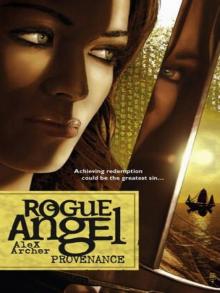 Provenance
Provenance Blood Cursed
Blood Cursed Fury's Goddess
Fury's Goddess The Spirit Banner
The Spirit Banner Footprints
Footprints The Pretender's Gambit
The Pretender's Gambit Rogue Angel: The Lost Scrolls
Rogue Angel: The Lost Scrolls Staff of Judea
Staff of Judea Rogue Angel 55: Beneath Still Waters
Rogue Angel 55: Beneath Still Waters The Mortality Principle
The Mortality Principle Warrior Spirit
Warrior Spirit Paradox
Paradox Tear of the Gods
Tear of the Gods Forbidden City
Forbidden City River of Nightmares (Rogue Angel)
River of Nightmares (Rogue Angel) Rogue Angel: The Secret of the Slaves
Rogue Angel: The Secret of the Slaves Destiny
Destiny Rogue Angel 51: The Pretender's Gambit
Rogue Angel 51: The Pretender's Gambit Celtic Fire
Celtic Fire Rogue Angel 54: Day of Atonement
Rogue Angel 54: Day of Atonement Day of Atonement
Day of Atonement Rogue Angel: Gabriel's Horn
Rogue Angel: Gabriel's Horn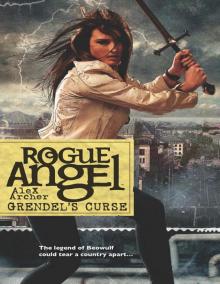 Grendel's Curse
Grendel's Curse The Matador's Crown
The Matador's Crown Rogue Angel: The Chosen
Rogue Angel: The Chosen The Other Crowd
The Other Crowd Seeker’s Curse
Seeker’s Curse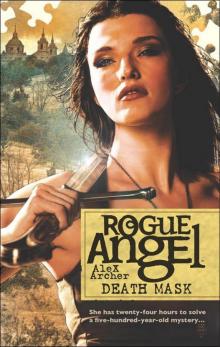 Rogue Angel 52: Death Mask
Rogue Angel 52: Death Mask The Golden Elephant
The Golden Elephant Blood Cursed (Rogue Angel)
Blood Cursed (Rogue Angel) Celtic Fire (Rogue Angel)
Celtic Fire (Rogue Angel) Gabriel's Horn
Gabriel's Horn Magic Lantern (Rogue Angel)
Magic Lantern (Rogue Angel) God of Thunder
God of Thunder Clockwork Doomsday
Clockwork Doomsday The Bone Conjurer
The Bone Conjurer Treasure of Lima
Treasure of Lima The Soul Stealer
The Soul Stealer The Dragon’s Mark
The Dragon’s Mark Restless Soul
Restless Soul Rogue Angel: God Of Thunder
Rogue Angel: God Of Thunder Rogue Angel 49: The Devil's Chord
Rogue Angel 49: The Devil's Chord Death Mask
Death Mask Rogue Angel 46: Treasure of Lima
Rogue Angel 46: Treasure of Lima Swordsman's Legacy
Swordsman's Legacy The Oracle's Message
The Oracle's Message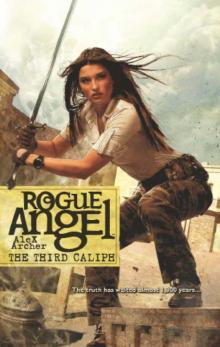 The Third Caliph
The Third Caliph Tribal Ways
Tribal Ways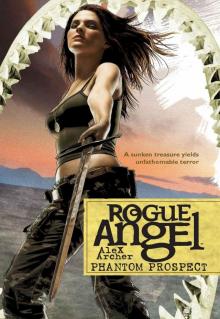 Phantom Prospect
Phantom Prospect Rogue Angel 50: Celtic Fire
Rogue Angel 50: Celtic Fire Library of Gold
Library of Gold Rogue Angel 53: Bathed in Blood
Rogue Angel 53: Bathed in Blood Sacred Ground
Sacred Ground The Devil's Chord
The Devil's Chord Serpent's Kiss
Serpent's Kiss The Vanishing Tribe
The Vanishing Tribe Sunken Pyramid
Sunken Pyramid Sunken Pyramid (Rogue Angel)
Sunken Pyramid (Rogue Angel) City of Swords
City of Swords Bathed in Blood
Bathed in Blood The Lost Scrolls
The Lost Scrolls The Babel Codex
The Babel Codex Mystic Warrior
Mystic Warrior Eternal Journey
Eternal Journey Beneath Still Waters
Beneath Still Waters Solomon's Jar
Solomon's Jar Beneath Still Waters (Rogue Angel Book 55)
Beneath Still Waters (Rogue Angel Book 55) Cradle of Solitude
Cradle of Solitude Secret of the Slaves
Secret of the Slaves River of Nightmares
River of Nightmares Polar Quest
Polar Quest False Horizon
False Horizon